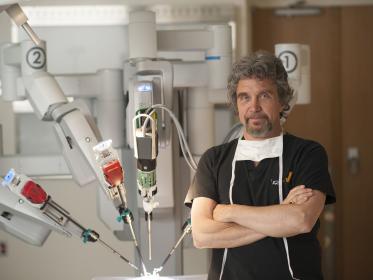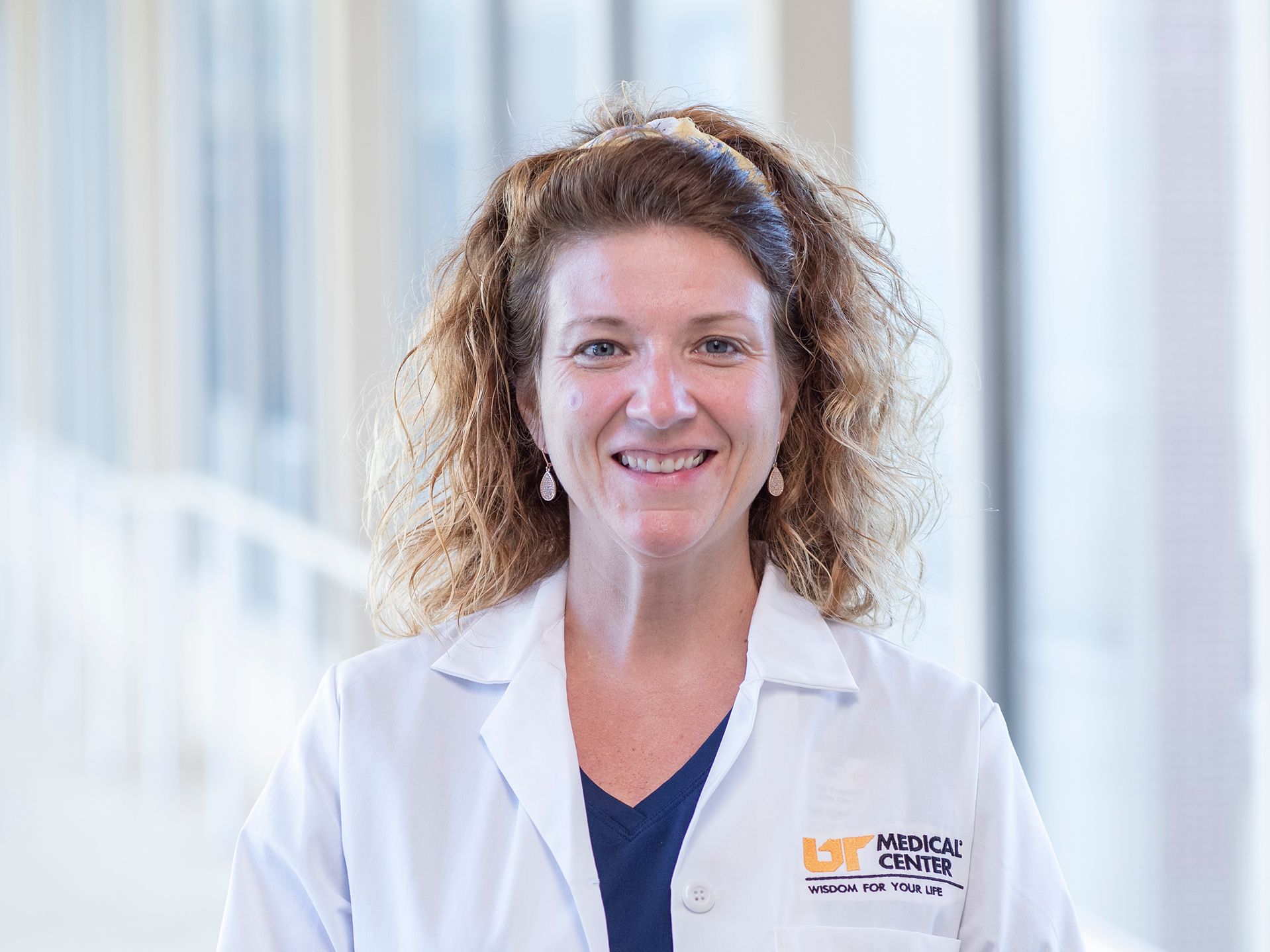Overview
University Gynecologic Oncology at The University of Tennessee Medical Center provides innovative and advanced medical and surgical treatment for patients coping with both precancerous and malignant gynecologic conditions, like cervical cancer. Our multidisciplinary team of physician, nurses, therapists and support staff provides comprehensive care for the treatment of all gynecologic cancers and serves as a regional referral center for women with cancers of the female reproductive tract.
Your Care at the Cancer Institute
The Cancer Institute at The University of Tennessee Medical Center offers the broadest spectrum of cancer specialists and services to care for our patients with gynecologic cancers.
Women have access to advanced diagnostic and treatment options including surgery, chemotherapy, radiation therapy and clinical trials for the management of gynecologic cancers. No matter the type of procedure, the gynecologic oncologists at the medical center have the necessary knowledge and skills for optimal surgical outcomes.
Gynecologic cancer is a group of cancers that affect the female reproductive system including ovarian cancer, uterine cancer, cervical cancer, endometrial cancer and other female genital cancers. Gynecologic cancer is the fourth most common type of cancer in women, affecting approximately 1 in 20 women. In the United States each year, approximately 80,000 women are diagnosed with a gynecologic cancer.
The Cancer Institute offers a highly trained team of gynecologic oncologists trained at some of the top cancer institutions in the country, bringing the best care to patients in our region.
Patients are reviewed at our weekly multidisciplinary conference where surgeons, medical oncologists, radiation oncologists, radiologists, pathologists, genetic counselors, nurses and clinical trials coordinators gather to determine the best individualized treatment plan for each patient. This level of coordination ensures that patients are receiving the highest level of care, offering the best outcomes and quality of life.
Our comprehensive care teams also include a registered dietitian, financial counselors, pastoral care, palliative care, and a social worker. Because gynecologic cancers can have a wide range of physical and emotional effects, we offer multi-dimensional services to strengthen mind, body, and soul for our patients and their families.
Diagnosing Your Cervical Cancer
Cervical cancer is cancer that starts in the cervix, the lower part of the uterus (womb) that opens at the top of the vagina. Cervical cancer usually develops very slowly. It starts as a precancerous condition called dysplasia. This precancerous condition can be detected by a Pap smear and is 100% treatable. Undetected precancerous changes can develop into cervical cancer and spread to the bladder, intestines, lungs, and liver. It can take years for precancerous changes to turn into cervical cancer. Patients with cervical cancer do not usually have problems until the cancer is advanced and has spread.
Getting regular Pap smears can help detect precancerous changes, which can be treated before they turn into cervical cancer. Pap smears effectively spot such changes, but they must be done regularly. Annual pelvic examinations, including a pap smear, should start when a woman becomes sexually active, or by the age of 20 in a non-sexually active woman.
A vaccine to prevent cervical cancer is now available. HPV (human papilloma virus) vaccination provides safe, effective, and long-lasting protection against cancer caused by HPV. HPV vaccine has a reassuring safety record that’s back by 10 years of monitoring and research.
Almost all cervical cancers are caused by HPV. There are many different types of HPV. Some strains lead to cervical cancer. (Other strains may cause genital warts, while others do not cause any problems at all.)
Precancerous changes of the cervix and cervical cancer cannot be seen with the naked eye. Special tests and tools are needed to spot such conditions.
- Pap smears screen for precancers and cancer, but do not make a final diagnosis.
- If abnormal changes are found, the cervix is usually examined under magnification. This is called colposcopy. Pieces of tissue are surgically removed (biopsied) during this procedure and sent to a laboratory for examination.
If the woman is diagnosed with cervical cancer, the health care provider will order more tests to determine how far the cancer has spread.
Your Treatment Options
The University of Tennessee Medical Center offers women the specialized field of gynecologic oncology and access to an entire team of cancer specialists. We use state-of-the-art treatments and techniques, including:
- Brachytherapy
- High Risk Breast and Ovarian Genetic Counseling
- Surgical Treatment Options
- Chemotherapy
- Radiation Therapy
Gynecologic oncologists at the medical center also have the necessary knowledge and skills in minimally invasive surgery including robotic surgery on the da Vinci Surgical System.
Studies have demonstrated that women treated by a gynecologic oncologist have a better likelihood of prolonged survival. Due to their extensive training and expertise, gynecologic oncologists can coordinate all aspects of a woman’s cancer care and recovery. Gynecologic oncologists understand the impact of cancer and its treatments on women’s lives including future childbearing, sexuality and physical and emotional well-being as well as the impact on the family.
Gynecologic oncologists manage the administration of chemotherapy drugs providing continuity of care for their patients. Intraperitoneal chemotherapy is available and utilized for appropriate patients to provide the best possible outcome. The gynecologic oncologists also collaborate with radiation oncologists to provide advanced radiation therapy including external beam radiation and high dose rate (HDR) brachytherapy. At the medical center, cutting-edge treatment is offered to patients along with opportunities to participate in National Cancer Institute and pharmaceutical clinical trials.
Your Next Steps
If you or a loved one has been diagnosed with cervical cancer, or if you are seeking a second opinion, please contact University Gynecologic Oncology.
New Gynecologic Oncology Patient Information
Visiting us for the first time? Let us help you prepare. Learn More
Our Cancer Institute team is here for you in what can be a very stressful time. Please don’t hesitate to ask questions and request help when you need it. Our new patient section will provide you additional information about the Cancer Institute and everything you need to know to prepare for your first visit.
For more information on cervical cancer, visit our External Resources page for several trusted sites to enhance your research and understanding of your diagnoses.
Belles Gyn Support Group
If you are a gynecologic cancer patient seeking support, we have the BELLES Gyn Support Group. This open format group meets monthly and provides women with an opportunity to share experiences, learn from one another, and to raise awareness though education about gynecologic cancers. The focus is empowerment, stress management, and developing healthy and effective ways to cope with cancer related issues. The group is offered free of charge to any woman diagnosed with a gynecologic cancer, regardless of where she is receiving or received care.














